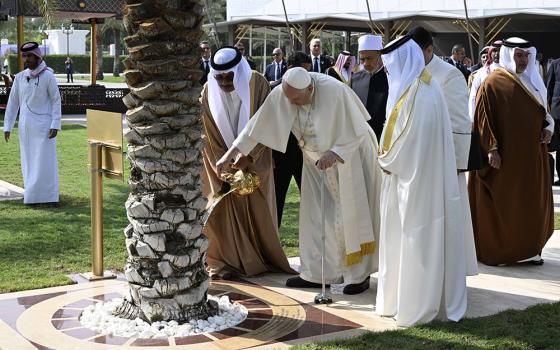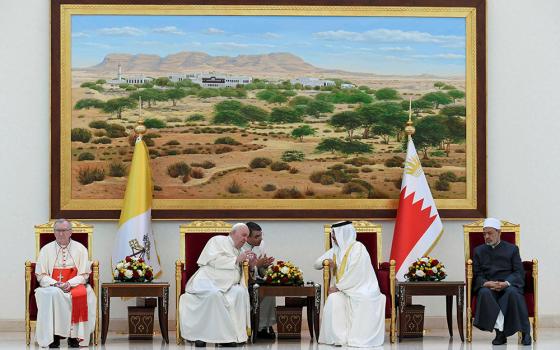Pope Francis addresses the Bahrain Forum for Dialogue: East and West for Human Coexistence Nov. 4, 2022, in Awali, Bahrain. Bahrain's King Hamad bin Isa Al Khalifa and Sheikh Ahmad el-Tayeb, grand imam of Egypt's Al-Azhar mosque and university, look on. (CNS photo/Vatican Media)
Pope Francis sketched a broad peace plan for the twenty-first century in an address to an inter-religious summit here on Nov. 4, calling on world leaders to reject imperialistic and nationalistic impulses that he said lead to "child-like" wars, and, instead, to prioritize the needs of those on the margins.
While Francis did not name any world leaders directly, he warned of "bitter consequences" if the world continued to "persist in stubbornly imposing our own models and despotic, imperialist, nationalist and populist visions, if we are unconcerned about the culture of others, if we close our ears to the plea of ordinary people and the voice of the poor."
In off the cuff remarks during the 15-minute address to the summit, the centerpiece of his four-day visit to the Persian Gulf nation, Francis went on to call for an end to the war in Ukraine, pleading for serious peace negotiations to begin.
In the prepared portion of the speech, the pope railed against what he termed a "few potentates," whom he said are "caught up in a resolute struggle for partisan interests." The stakes, he warned, could not be higher, alluding, as he has done often in recent months, to the threat of nuclear war.
"We appear to be witnessing a dramatic and childlike scenario," said Francis. "In the garden of humanity, instead of cultivating our surroundings, we are playing instead with fire, missiles and bombs, weapons that bring sorrow and death, covering our common home with ashes and hatred."
"After two terrible world wars, a cold war that for decades kept the world in suspense, catastrophic conflicts taking place in every part of the globe, and in the midst of accusations, threats and condemnations, we continue to find ourselves on the brink of a delicate precipice and we do not want to fall," he said.
Francis was speaking in remarks to the "Bahrain Forum for Dialogue: East and West for Human Coexistence," a gathering of some 200 various religious leaders held on the grounds of the country's royal palace.
The pope told those gathered there is only one choice for people of faith: to work together for peace and unity. "If we sail alone, we go adrift," Francis said.
The pope arrived in Bahrain on Nov. 3, becoming the first pontiff to ever visit the kingdom. In an address that day to government officials, Francis urged the country to strengthen its commitments to human rights, especially by ending the death penalty and religious discrimination.
Leading human rights organizations have charged the country's Sunni-Muslim leadership of religious discrimination against its Shiite-Muslim majority population. They accuse officials of imprisoning and torturing political dissidents.
Advertisement
Bahrain's King Hamad bin Isa Al Khalifa, host of the inter-religious summit, has maintained that the country is resolved to being a beacon of human rights in the Middle East and committed to religious pluralism.
During his speech at the closing session of the interfaith gathering on Nov. 4, Francis sought to nudge that commitment forward.
"Any form of religious coercion is unworthy of the Almighty, since he has not handed the world over to slaves, but to free creatures, whom he fully respects," said Francis, seated next to King Hamad.
"Let us commit ourselves, then, to ensuring that the freedom of creatures reflects the sovereign freedom of the Creator, that places of worship are always and everywhere protected and respected, and that prayer is favored and never hindered," he said. "It is not enough to grant permits and recognize freedom of worship; it is necessary to achieve true freedom of religion."
During his remarks, the pope also drew on the 2019 document on "Human Fraternity for World Peace and Living Together," which Francis signed with Grand Imam Ahmad el-Tayeb of Al-Azhar, during the pope's first ever visit to the Persian Gulf in the United Arab Emirates.
The document is widely viewed as a major advancement in the Catholic Church's relationship with the Muslim world, and among its notable declarations is a vehement rejection of terrorism and the use of religion to justify war and violence.
In Bahrain, where Francis was again joined by el-Tayeb, the pope doubled down on those joint pledges.
"It is not enough to proclaim that a religion is peaceful; we need to condemn and isolate the perpetrators of violence who abuse its name," said Francis. "Nor is it enough to distance ourselves from intolerance and extremism; we need to counter them."
In a venue with representatives of most of the world's major religious traditions present, Francis said that the true measure of leadership is the attention they devote to the most marginalized in society.
"The Creator invites us to act, especially on behalf of all those many creatures of his who do not yet find a sufficient place on the agenda of the powerful: the poor, the unborn, the elderly, the infirm, migrants," said Francis.
"If we who believe in the God of mercy, do not give a hearing to the poor and a voice to the voiceless, who will do it?," he asked. "Let us take their side."






